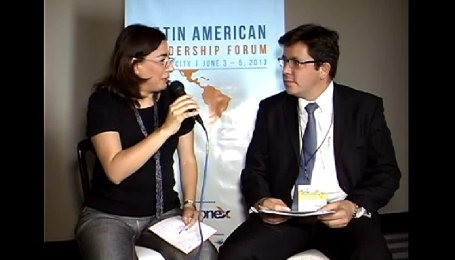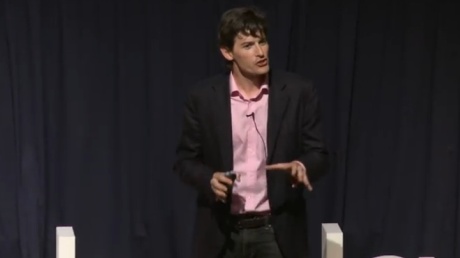Alumni
The GLF Alumni is a vibrant community of approximately 200 individuals who have graduated from the Global Leadership Fellows Programme since its inception in 2005. Members are leaders in the private, public and not-for-profit sectors, working in the fields of international relations, academia and civil society; some even work at the World Economic Forum. The community brings together outstanding individuals with a strong devotion and loyalty to the mission and values of the Forum.
GLF Alumni benefit from exclusive networking opportunities, insights and information, and connection with the Forum and its resources. The key event of the community is the Annual Alumni Meeting. It takes place in the autumn and is an essential networking and learning platform.
Lakshmi Sundaram
Executive Director, Girls no Brides, London, UK
Global Leadership Fellow, cohort 2007

"Millions of children die from preventable diseases every year; even when they survive, millions more cannot achieve their full potential due to a lack of education and economic opportunities, or because they live in situations of conflict or are married off before they become adults. As a professional working in international development, I come across these types of statistics every day. Through an accident of birth, I have managed to avoid becoming one of these statistics. A Swiss citizen born and brought up in Geneva, I was lucky enough to grow up with a loving family, in a multicultural environment free from strife, and exposed to a range of opportunities.
I came to the World Economic Forum from a career focused on various aspects of global health, with a particular interest in looking at how different sectors of society – including governments, civil society and the private sector – can work together to help solve seemingly intractable problems.
My professional focus at the Forum was in its Global Health Initiative, where I ran some of the Forum programmes related to global health partnerships. When I first arrived, I must admit that I was not sure what to expect from the Global Leadership Fellows (GLF) programme. I felt that I already had solid academic training, with a Bachelor’s degree in biochemistry from the University of Cambridge and Master’s degrees in international affairs and public health from Columbia University.
What I did find was that the programme allowed me to periodically take a step back from my hectic day-to-day routine and explore different ideas and concepts. One of its most valuable aspects was that it gave me the opportunity to testdifferent leadership approaches and skills in a safe space withinaremarkable network of peers. Learning about leadership in an environment where you can witness how global leaders interact at close range emphasizedfor me that effective leadership can take many different forms, and pushed me to think critically about how to create my own leadership style.
I now head the secretariat of Girls Not Brides, a global partnership of over 250 organizations in more than 40 countries who are committed to bringing an end to child marriage, a practice that has a devastating effect on the lives of girls around the world. The partnership was initiated by The Elders; the members range from small grassroots groups to large international NGOs, and work across a broad range of sectors, including human rights, health, education and economic empowerment.
Through this position, I have the privilege of bringing attention to the work of a range of inspirational and talented individuals who are dedicating their lives to addressing child marriage. I find myself drawing on lessons from the GLF programme on a regular basis, not only while trying to make sure that this traditionally hidden issue is addressed in high-level international dialogues, but especially in coordinating a vast network of groups committed to building a global movement and speaking with a common voice on the needs of girls around the world."
Julio Estrada
Minister of Finance, Guatemala
Global Leadership Fellow, cohort 2005

Julio holds a BA in Economics from UFM in Guatemala and an MBA from INSEAD in France. Before joining the GLF programme, his background included founding and leading a 200+ employee firm in Guatemala, a small projects office NGO in Tecpan, strategy consulting for A.T. Kearney in Switzerland and Germany, and risk management with Citibank Switzerland.
Julio joined the GLF programme in 2005, where he worked as Associate Director for Latin America until 2008. He was also very active in research and publishing efforts, having led scenario planning projects on China and banking, as well as a number of competitiveness studies on Latin America in cooperation with multilateral companies and the OECD development centre, among others.
After the programme, Julio led the National Competitiveness Agency in Guatemala (PRONACOM), a public-private partnership in charge of the country’s most ambitious economic and administrative reforms aimed at modernizing and boosting productive capacity. In this role, he reported directly to the President of Guatemala. Julio left PRONACOM to work on a family real estate development venture, which is one of the top five housing developers in Guatemala. In late 2012, Julio returned to the public sector as Head of the Agency for Private-Public Partnerships in Infrastructure, a new government institution in charge of leading, structuring and seeing through private investments in transport, energy and other public service-related infrastructure.
Miniya Chatterji
Chief Sustainability Officer, Jindal Steel and Power, India
Global Leadership Fellow, cohort 2011

"I had to run away from home for a year to complete my basic education. I was never the best student in class, but I knew that education was the key to choice. A decade and a PhD later, education gave me the strength again to move out of my professional and personal comfort zone towards identifying and doing all that I truly loved to do and was passionate about. Life is too short and beautiful to live trapped.
After growing up 21 years in about half a dozen cities in India, I moved to France for my university studies at the prestigious Sciences-po in Paris. There, alongside my studies, I was fortunate to work for a few years in President Chirac’s office, first as an intern and then advising on relations with India and Africa, and writing speeches. It was the most fun thing to do and I think I often forgot to sleep. The only person disappointed was my PHD director who sent me off to the United States hoping to bring me back to academia and finish the PhD thesis at Columbia University in New York.
His plan did not work as I returned to Europe within a year. I initially joined Goldman Sachs in its London office and then the following year I returned to Paris to manage a fund of hedge funds. Despite growing up amid thriving socio-economic disparities in India, I have never witnessed more gaps related to income, gender and status than in the finance industry. So, starting with volunteering for non-profit organizations and contributing where I could to the lives of women in the industry and back home in India, consequently I created my own non-profit company dedicated to the cause.
It is said that often you want to give to others what you yourself wanted as a child. That same year, when I was 29, I completed my PhD and also quit the finance industry. I also left Paris to live in Brussels, Berlin, Cairo and then in Beijing. Further, I started writing again, mostly editorial opinion pieces in leading newspapers, and also a fiction book manuscript that I have yet to feel comfortable enough to take to a literary agent.
This was the point where I joined the Global Leadership Programme and the Young Global Leaders team, to manage the Middle East, North Africa and South Asia regions at the World Economic Forum.
By this time I was clear that I wanted to make a difference in the world – on people and on important issues – in whatever way I could. Moving from big politics and banks, I was happy to have an impact on a few people’s thinking or changing a few lives via my non-profit company and my writing. However, I also realized this was not enough to achieve what I really wanted. Scale, I understood, is important to drive substantial social change.
The Global Leadership Programme, and my role at the World Economic Forum, is a rare opportunity to broaden my perspective of the world and to learn how to build major multistakeholder partnerships towards improving the state of the world. It gives me the chance to observe how leaders think and act from close quarters, and then to use those lessons in my role at the Forum, and also directly in my non-profit company and my writing.
The biggest impact of the Global Leadership Programme for me comes from the incredible relationships I have shared with some of my GLF cohorts. They have allowed for the most cherished friendships and the toughest lessons in self-awareness. The programme is rare in bringing together such a powerful peer group, offering an unparalleled academic programme combined with hands-on experience, and for continuously encouraging me to drive change via the World Economic Forum, in my endeavours towards that objective outside my Forum role, and in the future.
In a few years I would like to return to live in India, where playing a role in politics focusing on the social sphere would be a next step. This would probably be to ensure that young girls of the country do not have to run away from home to avail of what must be their basic rights."
Miniya Chatterji graduated from the Global Leadership Fellows Programme in 2014 and currently works as the Chief Sustainability Officer in Jindal Steel and Power, New Delhi, India
Nicholas Davis
Head of Society and Innovation, Member of the Executive Committee, World Economic Forum
Global Leadership Fellows, cohort 2006

Bachelor of Arts, University of Sydney; Bachelor of Laws (Hons), University of Sydney; MBA (Hons), University of Oxford. Admitted to the Supreme Court of New South Wales as Solicitor and Barrister
Strategy professional and scenario expert focused on links between the private sector, non-profits and public policy in economic development, stakeholder management, organizational performance and risk management. 2001-03, Commercial Lawyer, Windeyer Dibbs Lawyers; 2003-06, Director, Oxford Investment Research.
Since 2006, with World Economic Forum, focusing on catalysing responses to global, regional and industry challenges; Co-Editor, Global Risks 2011, Sixth Edition; Deputy Head and Adviser, Strategic Risk Foresight Team; Director, Head of Constituents and Strategic Initiatives; since 2013, Director, Head of Europe. Blogger on an inter-disciplinary view of scenarios, decision-making and systemic issues facing the world. Recipient of awards and honours, including: Australian Leadership Award; Fellow, Royal Society of Arts, UK (FRSA).
Katherine Milligan
Schwab Foundation for Social Entrepreneurship, World Economic Forum

Katherine received a BA from Dartmouth College and an MA in Public Policy from the Harvard Kennedy School of Government, where she was the recipient of the Pforzheimer Scholarship for Excellence in Non-profit Management.
After working as the director of a grassroots development organization in West Africa from 1999 – 2001, Katherine went on to do strategy consulting for the Center for Global Development, PBS Frontline and the African Public Broadcasting Foundation. After she finished her Master’s degree, she obtained a prestigious Sheldon Knox Research Fellowship at Harvard University and spent a year interviewing nearly 200 people on four continents on the political and economic dimensions of the Doha round of negotiations on agricultural subsidies at the World Trade Organization. The findings were published by the Harvard Business School and the International Institute of Economics.
Katherine joined the Forum in 2005 as a GLF, where she gained exposure to several parts of the organization. Currently, she is the Deputy Head of the Schwab Foundation for Social Entrepreneurship, focusing on strategic initiatives to support leading social entrepreneurs and advance the field of social innovation.

